Duncan Fletcher: From Zimbabwe to India via Wales and England
- Published
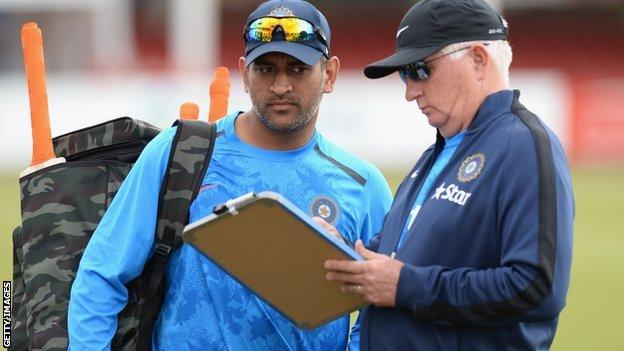
Duncan Fletcher places huge importance on his relationship with his captain
From taxi drivers in Harare to recipients of medical aid cheques in Bulawayo; from the thousands at an open-top bus parade, external in Trafalgar Square to a billion-plus fans in India; from cricketing greats past to future stars.
Duncan Fletcher's influence has touched so many, both on and off the cricket field - all of it done in his own quiet, analytical, observing-from-behind-the-shades kind of way.
Cricket lovers in England will fondly remember Fletcher as the man who masterminded their first Ashes series victory in 18 years in 2005 -, external getting the better of Shane Warne, Glenn McGrath et al - but now he is back on these shores plotting the downfall of his former employers.
Don't be surprised if India's Zimbabwe-born head coach succeeds. The list of those queuing up to label him as one of the best coaches in cricket would form the basis of a pretty formidable World XI.
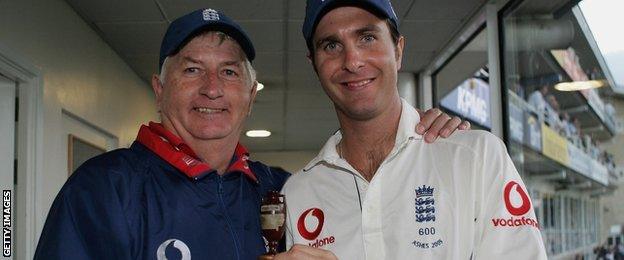
Duncan Fletcher (left) became an OBE after England won the Ashes for the first time in 18 years back in 2005
"Fletcher was simply the best analytical cricket coach I ever worked with," says former England captain Michael Vaughan.
"He understands batting better than anyone I know," adds South African Jacques Kallis, statistically the best all-rounder the game has seen., external
"He changed the culture of how we played," enthuses Marcus Trescothick, who scored more than 10,000 international runs for England.
Such rave reviews would not look out of place on the back of a DVD, but what makes Fletcher such a five-star coach?
First of all, it's worth getting to know the work of the man away from cricket.
In his previous career in systems management, he helped devise the number-plate system in Zimbabwe.
Fletcher and his team were asked to make it easier for witnesses of hit-and-run accidents to remember the number plate, so they added an alpha character to the end of the existing six-digit sequential system.
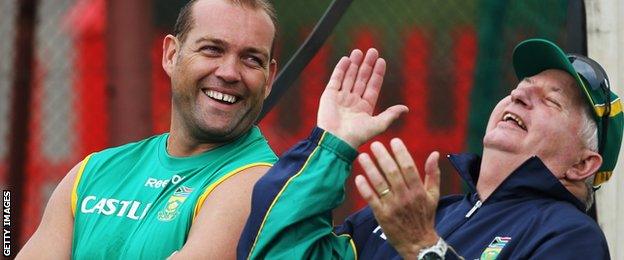
"Fletch is perceived as a serious person, but actually he is quite chilled," says Jacques Kallis. "He is fun to be around. We have had a few great games of golf together - always competitive but fair and enjoyable."
That was no big deal in his eyes, though. He was more proud of a document he designed for Cimas,, external a medical aid society in his homeland.
"I could not understand why they needed to send out two documents to claimants, one containing financial details and one a cheque," wrote Fletcher in his autobiography.
"Why not have one page with the statement at the top and the cheque section at the bottom which can be torn off by having a perforated line?
"I was told that only sanctions prevented it winning a new design competition in America."
Fletcher was also a decent cricketer in his pomp - never really getting the chance to show his potential because of Zimbabwe's lack of exposure on the international stage.
However, as captain of his country, he led from the front in a shock defeat of Australia at the 1983 World Cup -, external top-scoring with 69 not out and taking 4-42 with his brisk medium pace.
Duncan Fletcher's coaching CV |
|---|
Began with Western Province in South Africa before moving to Glamorgan |
First foreigner to coach England, in 1999; first not to have played Test cricket |
Led England from bottom of Test rankings to third in eight years in charge |
Made OBE for guiding England to 2005 Ashes win |
Oversaw England's 5-0 whitewash down under in the 2006-7 Ashes series |
Replaced by Peter Moores as England coach in April 2007 |
Succeeded Gary Kirsten as India coach in April 2011 |
Toured England later that summer but lost Test series 4-0 |
India beat England in the final of the 2013 Champions Trophy |
A proud moment perhaps, but nothing compared to the scale of his achievements as a coach.
Success at Western Province and Glamorgan caught the eye of England, whom he took from the bottom of the Test world rankings in 1999 to that famous 2-1 Ashes success of 2005.
But that glorious summer was no fluke. It had been years in the making, and the culmination of the very best-laid plans.
"The 2005 Ashes series is what all of that team is remembered for," says fast bowler Steve Harmison, who took 17 wickets in the five-match series.
"Duncan had set plans for all of the top Australian batsmen like Matthew Hayden, Justin Langer, Ricky Ponting, Damien Martyn, Adam Gilchrist etc.
"We stuck to those plans - like getting Andrew Flintoff to bowl around the wicket to Gilchrist - and it worked for us."
Strategies for individual batsmen are Fletcher's hallmark, and he will even have plans in place for uncapped county batsmen this summer - just in case they get an unexpected call-up during the five-Test series against India.
"Duncan will have studied every part of English cricket for the last 12 months, even looking at young players who are not in the team yet," says Harmison.
"He will have plans for every eventuality - whether it's for the first ball delivered in a match or if it's to set up a batsman over the course of two or three overs.
"One example stands out for me. In the 2003 World Cup, Duncan had a strong suspicion that Pakistan's Mohammad Yousuf (then known as Yousuf Youhana) would fall over when facing his first delivery.
"Jimmy Anderson was told to bowl a yorker, really full of length, and he got him out first ball. It wasn't a one-off - that happened a few times in future series against Pakistan."
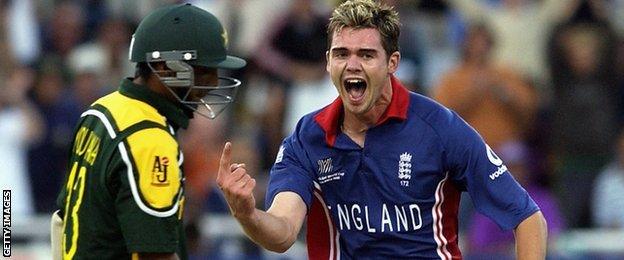
Yousuf Youhana is dismissed for a first-ball duck by James Anderson - helped by Fletcher
Wherever you look, world-class players are quick to outline their own examples of where Fletcher made a tiny, but significant, difference.
"He loved explaining to batsmen why the forward press was important against spinners," wrote Vaughan in 2011., external
"He would talk about looking under the ball because it gives you more time to pick up length. The little ideas he taught me as a player were things no other coach mentioned to me."
Kallis, who scored 13,289 Test runs and took 292 wickets, would often turn to his boyhood mentor when suffering a poor run of form.
"He always works out a solution in his head prior to changing anything," Kallis tells BBC Sport.
"Because he is such a good technical batting coach, he can also help bowlers. If you understand what batsmen are thinking, you can construct a plan as a bowler."
But what about Fletcher the person? Well, there's a clue in the title of his autobiography: Behind the shades.
"He has much more of a sense of humour than he allows to be shown in public," says Jonathan Agnew, the BBC's chief cricket correspondent, who played under Fletcher for Harare-based Alexandra Sports Club in the early 1980s.
"Duncan regrets the way he portrays himself in public - there's more to him than looking grumpy with shades on. Unfortunately he doesn't show it very often."
Away from cricket, Fletcher enjoys barbecues with friends, playing golf and watching rugby. In fact, he considered transferring his coaching skills to union when he left his England post in 2007. "I would rather watch rugby than cricket," he said., external
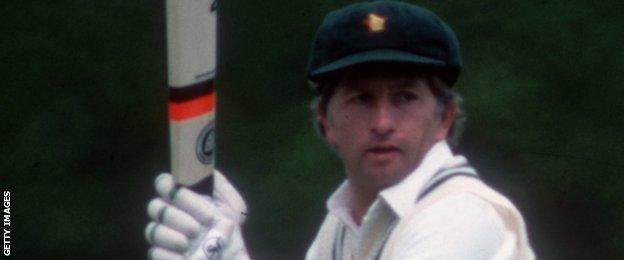
Fletcher played six one-day internationals for Zimbabwe, scoring 191 runs and taking seven wickets
His love for the oval-shaped ball was never more evident than during his spell as Glamorgan coach.
"He was a big supporter of Wales at the time," says ex-Glamorgan captain and England and Wales Cricket Board chief executive Hugh Morris.
"At the end of his first season with us in 1997, we won the County Championship in our final game at Taunton and the present from the team was a Welsh rugby shirt which he wore with a lot of pride."
However, Fletcher only lets a select few get to know him away from cricket - to the frustration of some who prospered under his leadership.
"I was thankful for everything Duncan did for my career, but he was not somebody I could get close to," says Harmison. "Duncan was closer to the batsmen and would let his bowling coaches get close to the bowlers.
"Duncan didn't get close to too many people. He was a very detached person and that's how it worked for him. There were a few times when you saw the lighter side of him and you wanted to see more of that, but it very rarely came out."
Harmison does, however, recall Fletcher giving him a "little hug" when the tall fast bowler dismissed Michael Kasprowicz in England's dramatic, series-levelling, two-run victory over Australia at Edgbaston in 2005., external
That glorious summer will live long in the memory for both Harmison and Fletcher - but can the veteran coach enjoy an 'Indian summer' with the tourists at the expense of his former employers?
England v India 2014 Test series | |||
|---|---|---|---|
Match | Date | Venue | Result |
First Test | 9-13 July | Trent Bridge | Drawn |
Second Test | 17-21 July | Lord's | - |
Third Test | 27-31 July | Rose Bowl | - |
Fourth Test | 7-11 August | Old Trafford | - |
Fifth Test | 15-19 August | The Oval | - |
Harmison believes the 65-year-old can turn India, who drew the first of their five-Test series against England at Trent Bridge, into one of the best teams in the world - in all formats.
Legends of the game such as Sachin Tendulkar, Rahul Dravid and VVS Laxman have retired, and Fletcher has indentified the likes of Virat Kohli, Cheteshwar Pujara and Ravindra Jadeja as exciting young talent he can nurture and turn into world-beaters.
"Duncan embraces the local culture and the different personalities of the players," says Harmison. "He will hone that into a very efficient working unit."
Kallis agrees: "India are very fortunate to have Duncan. Players like Kohli, Ajinkya Rahane and MS Dhoni are going to benefit a lot from his input.
"He has a specific way of coaching that, when players buy into it, can make a huge difference. I know that Duncan would never take the Indian job if he didn't think he could make a difference."
- Published15 July 2014
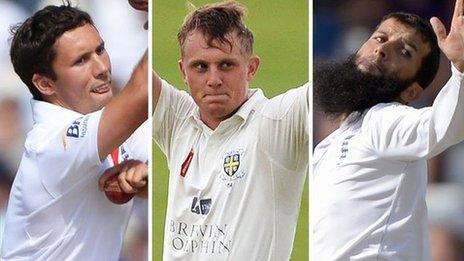
- Published13 July 2014
- Published15 July 2014
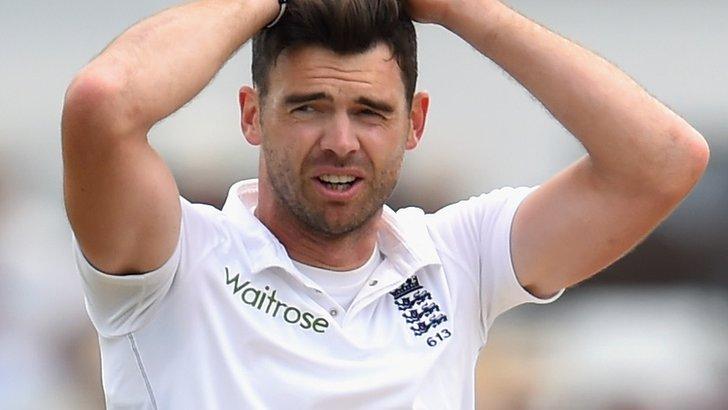
- Published13 July 2014
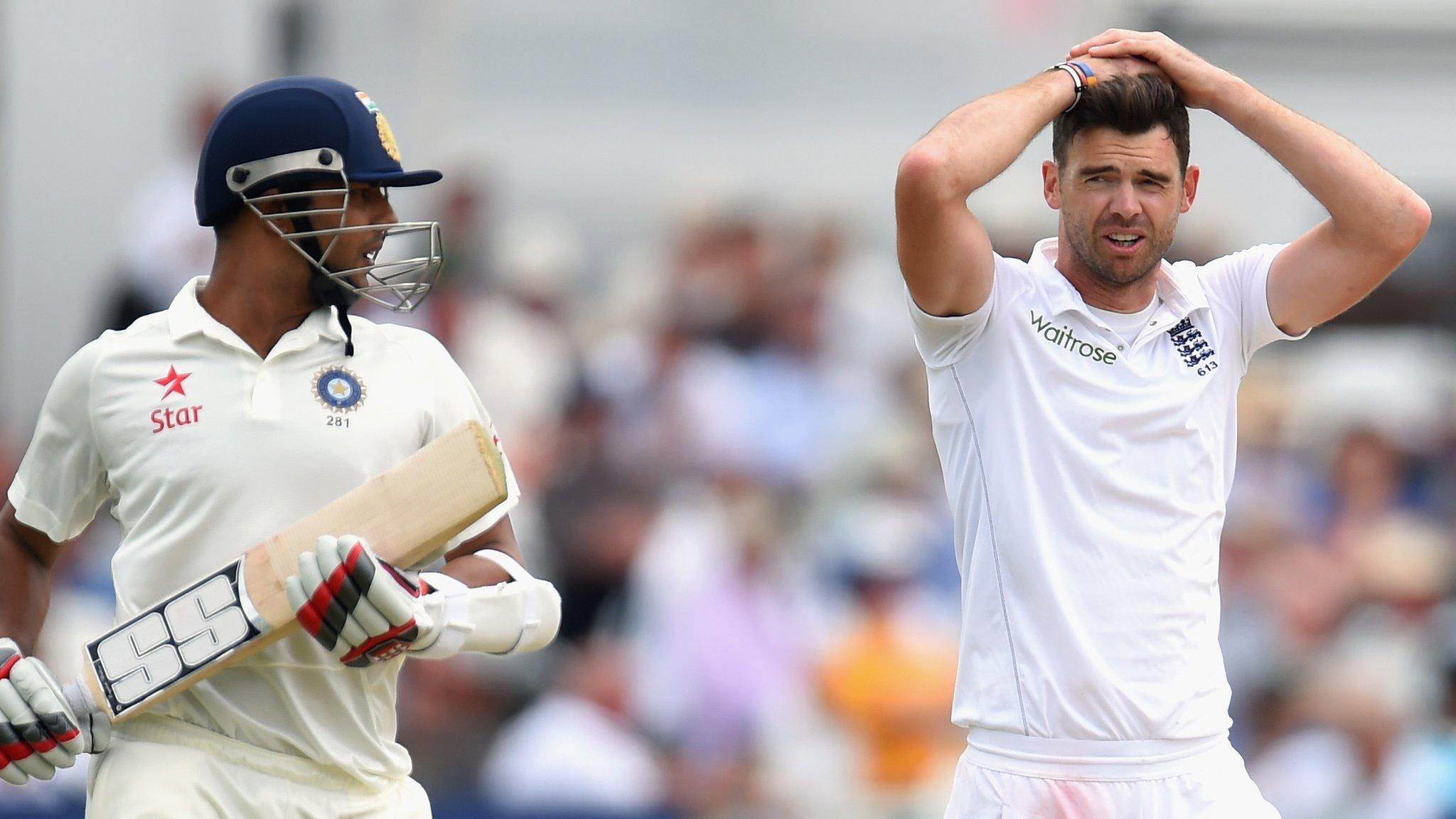
- Published27 April 2011
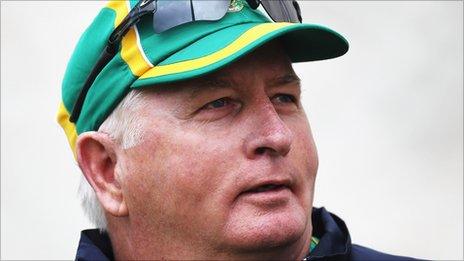
- Published27 April 2011
- Published13 July 2014
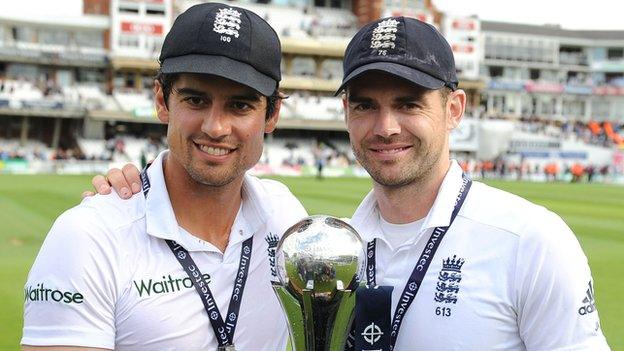
- Published18 October 2019
